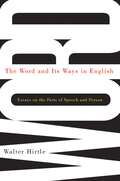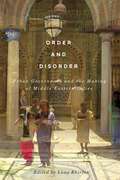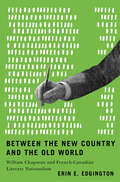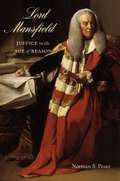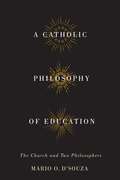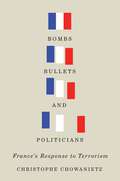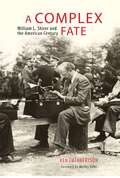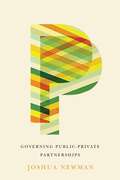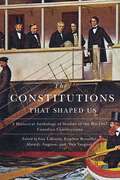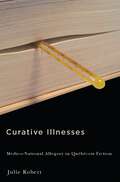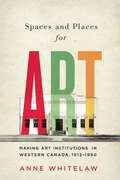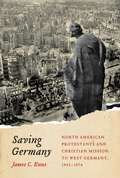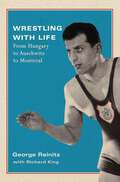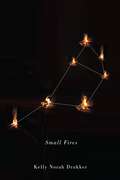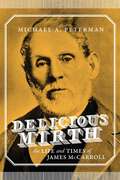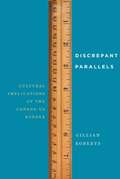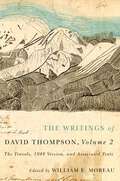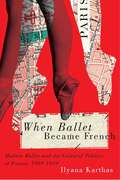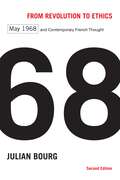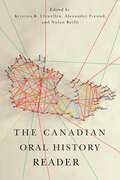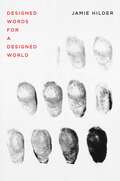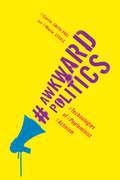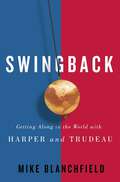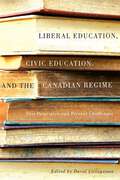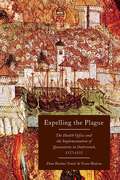- Table View
- List View
The Word and Its Ways in English: Essays on the Parts of Speech and Person
by Walter HirtleAn exploration of how the mind creates words and, in turn, how words represent intended meanings.
Order and Disorder: Urban Governance and the Making of Middle Eastern Cities (McGill-Queen's Studies in Urban Governance)
by Luna KhirfanAn exploration of the dynamics between the state, the market, and civil society in Middle Eastern cities.
Between the New Country and the Old World: William Chapman and French-Canadian Literary Nationalism
by Erin E. EdgingtonPoet and provocateur William Chapman (1850–1917) wrote patriotic verse recounting the history of New France, envisioning a glorious future for its descendants. Despite his many literary achievements – he was a two-time laureate of the Académie française and a nominee for the Nobel Prize in Literature – Chapman is more often remembered for his explosive feud with Louis Fréchette, a rivalry that pitted the two national poets against one another and played out in vicious invective across the pages of Quebec newspapers.Chapman’s lifelong quest to glorify French Canada and accumulate literary prestige in North America and Europe positioned him squarely between the new country and the old world. Over the course of his forty-year career, Chapman published five collections of poetry – Les Québecquoises (1876), Les Feuilles d’érable (1890), Les Aspirations (1904), Les Rayons du Nord (1909), and Les Fleurs de givre (1912) – whose very titles underscore his devotion to French-Canadian identity, as well as his literary ambition. Integrating close readings of Chapman’s verse with archival material related to his writing life, Erin Edgington revisits his full oeuvre on its own terms and in context, discerning the particular ways Chapman expressed the ideas of literary value and national literature that motivated him from a young age, from juvenilia like Les Mines d’or de la Beauce (1881) to his polemical essays and his unfinished magnum opus, L’Épopée canadienne.Between the New Country and the Old World challenges the prevailing narrative that has labelled Chapman a second-rate, forgettable poet, showing how his life and work reveal important insights into literary fame, poetics in a transitional moment at the turn of the century, and the history of French literature in North America.
Lord Mansfield: Justice in the Age of Reason
by Norman PoserThe life and times of the great eighteenth-century judge and statesman, whose legacy continues to influence Anglo-American law and society.
A Catholic Philosophy of Education: The Church and Two Philosophers
by Mario O. D'SouzaExploring a Catholic philosophy of education in the modern world.
Bombs, Bullets, and Politicians: France’s Response to Terrorism (Human Dimensions in Foreign Policy, Military Studies, and Security Studies)
by Christophe ChowanietzAn in-depth and comparative inquiry into the reactions of political elites in the aftermath of terrorist attacks.
A Complex Fate: William L. Shirer and the American Century (ISSN)
by Ken CuthbertsonThe first biography of one of the most provocative and influential American journalists and historians of the twentieth century.
Governing Public-Private Partnerships
by Joshua NewmanA look at the dilemmas involved in using the private sector to deliver public infrastructure.
The Constitutions that Shaped Us: A Historical Anthology of Pre-1867 Canadian Constitutions
The Constitutions that Shaped Us re-examines from a comparative and critical standpoint the events, key players, and texts which, taken together, help to interpret all Canadian constitutions prior to Confederation. The key constitutional documents that are studied in this book are the Royal Proclamation of 1763, the Quebec Act of 1774, the Constitutional Act of 1791, and the 1840 Act of Union. Great Canadian historians of the past take turns in providing unforgettable sketches and understandings of the actions of monumental figures such as Governors Murray, Carleton, and Elgin, British politicians from Pitt to Burke, Grey, and Durham, without forgetting the leading political and intellectual colonial figures such as Bédard, Papineau, La Fontaine, Mackenzie, and Baldwin. Gathering together the most renowned and representative works of constitutional scholarship, this anthology provides readers with an in-depth account of the events that would ultimately lead to the union of British colonies, the birth of the Dominion of Canada, and the rebirth of political autonomy in a colony known successively as Quebec, Lower Canada, Canada East, and once again Quebec in 1867. Following a general survey of the various constitutions enacted under British rule, this collection includes an equal number of commentaries by French- and English-speaking historians concerning each of the four constitutions to offer the most nuanced view of Canada’s origins to date.
Curative Illnesses: Medico-National Allegory in Québécois Fiction
by Julie RobertA necessary second opinion on the national implications of an epidemic of sick literary characters.
Spaces and Places for Art: Making Art Institutions in Western Canada, 1912-1990 (McGill-Queen's/Beaverbrook Canadian Foundation Studies in Art History #37)
by Anne WhitelawA pioneering study of art museums in western Canada and their relationship to federal cultural institutions.
Saving Germany: North American Protestants and Christian Mission to West Germany, 1945-1974 (McGill-Queen's Studies in the History of Religion)
by James EnnsWith Nazism defeated and Communism encroaching, Christian missionaries left for Germany to fight for the soul of a nation.
Wrestling with Life: From Hungary to Auschwitz to Montreal (Footprints Series #25)
by Richard King George ReinitzA story of survival and renewal from Auschwitz to success in sport and business.
Small Fires (The Hugh MacLennan Poetry Series #36)
by Kelly DrukkerPoems that illustrate the stories that lie buried in landscapes and in human lives.
Delicious Mirth: The Life and Times of James McCarroll
by Michael PetermanRecovering the lyrical voice and remarkable literary life of James McCarroll, Canada's Irish-born poet and humorist.
Discrepant Parallels: Cultural Implications of the Canada-US Border (ISSN)
by Gillian RobertsAn examination of the divergent Canadian cultural investments in the Canada-US border.
The Writings of David Thompson, Volume 2: The Travels, 1848 Version, and Associated Texts
by William E. MoreauA compelling tale of exploration, encounter, and commerce, from the Rocky Mountains to the mouth of the Columbia River.
When Ballet Became French: Modern Ballet and the Cultural Politics of France, 1909-1939
by Ilyana KarthasA comprehensive picture of early twentieth-century French culture through the lens of ballet discourse.
From Revolution to Ethics, Second Edition: May 1968 and Contemporary French Thought
by Julian BourgA bold history of French intellectual life and the legacies of 1960's radicalism.
The Canadian Oral History Reader (Carleton Library Series #231)
by Alexander Freund Nolan Reilly Kristina R. LlewellynAn indispensable collection of state-of-the-art work in oral history by Canadian scholars.
Designed Words for a Designed World: The International Concrete Poetry Movement, 1955-1971
by Jamie HilderReading concrete poetry as the world&’s first global literary movement.
Awkward Politics: Technologies of Popfeminist Activism
by Carrie Smith-Prei Maria StehleA cutting-edge study that shows how awkwardness uncovers feminist politics at work in the digital age.
Swingback: Getting Along in the World with Harper and Trudeau
by Mike BlanchfieldHow Stephen Harper changed Canadian foreign policy, and how Justin Trudeau is trying to turn it around.
Liberal Education, Civic Education, and the Canadian Regime: Past Principles and Present Challenges
by David W. LivingstoneReflections on the education some early Canadians thought necessary for citizenship, and contemporary threats to that education.
Expelling the Plague: The Health Office and the Implementation of Quarantine in Dubrovnik, 1377-1533 (McGill-Queen's/Associated Medical Services Studies in the History of Medicine, Health, and Society)
by Vesna Blazina Zlata Blazina TomicA vibrant city-state on the Adriatic sea, Dubrovnik, also known as Ragusa, was a hub for the international trade between Europe and the Ottoman Empire. As a result, the city suffered frequent outbreaks of plague. Through a comprehensive analysis of these epidemics in Dubrovnik, Expelling the Plague explores the increasingly sophisticated plague control regulations that were adopted by the city and implemented by its health officials. In 1377, Dubrovnik became the first city in the world to develop and implement quarantine legislation, and in 1390 it established the earliest recorded permanent Health Office. The city’s preoccupation with plague control and the powers granted to its Health Office led to a rich archival record chronicling the city’s experience of plague, its attempts to safeguard public health, and the social effects of its practices of quarantine, prosecution, and punishment. These sources form the foundation of the authors' analysis, in particular the manuscript Libro deli Signori Chazamorbi, 1500-30, a rare health record of the 1526-27 calamitous plague epidemic. Teeming with real people across the spectrum, including gravediggers, laundresses, and plague survivors, it contains the testimonies collected during trial proceedings conducted by health officials against violators of public health regulations. Outlining the contributions of Dubrovnik in conceiving and establishing early public health measures in Europe, Expelling the Plague reveals how health concerns of the past greatly resemble contemporary anxieties about battling epidemics such as SARS, avian flu, and the Ebola virus.
